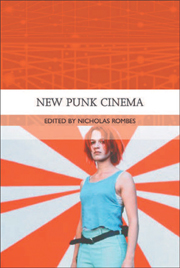Book contents
- Frontmatter
- Contents
- Notes on the Contributors
- Acknowledgements
- Introduction
- PART I BACKGROUNDS AND CONTEXTS
- PART II SCREENING NEW PUNK CINEMA
- PART III CASE STUDIES
- 10 Dogma Brothers: Lars von Trier and Thomas Vinterberg
- 11 Mike Figgis: Time Code and the Screen
- 12 What Was the Neo-Underground and What Wasn't: A First Reconsideration of Harmony Korine
- 13 Repo Man: Reclaiming the Spirit of Punk with Alex Cox
- Bibliography
- Index
13 - Repo Man: Reclaiming the Spirit of Punk with Alex Cox
from PART III - CASE STUDIES
Published online by Cambridge University Press: 05 August 2013
- Frontmatter
- Contents
- Notes on the Contributors
- Acknowledgements
- Introduction
- PART I BACKGROUNDS AND CONTEXTS
- PART II SCREENING NEW PUNK CINEMA
- PART III CASE STUDIES
- 10 Dogma Brothers: Lars von Trier and Thomas Vinterberg
- 11 Mike Figgis: Time Code and the Screen
- 12 What Was the Neo-Underground and What Wasn't: A First Reconsideration of Harmony Korine
- 13 Repo Man: Reclaiming the Spirit of Punk with Alex Cox
- Bibliography
- Index
Summary
[W]hile so many of his contemporaries have willingly exchanged their independent vision for major studio financing, Cox appears more than ever to embody the punk spirit which he first encountered while a film student in Los Angeles at the end of the Seventies.
(Collins 2001: 35).Alex Cox is very simply a punk-film phenomenon. He represents that rare breed of film-maker whose love of underground, off-centre and unseen cinema has resulted in him creating a series of defiantly independent works which continually fly in the face of the cinematic orthodoxy.
As a director, Cox first bedazzled and bemused mainstream Hollywood with his offbeat comedy/conspiracy-theory/road movie-inspired début Repo Man. The film featured an up-and-coming young Emilio Estevez as a disenfranchised punk rocker who is thrown into a number of surreal encounters after joining a vehicle-repossession agency hot on the trail of a nuclear-powered vehicle from outer space.
With its penchant for genre mixing, as well as its pounding Los Angeles underground music score, Repo Man was inextricably linked to the punk philosophy informing its creator. For cultural studies critics such as John Fiske, the subcultural activity of such marginal movements can be defined by the concept of ‘bricolage’, whereby ‘the subordinated make their own culture out of the resources of the “other”’ (Fiske 1990: 150). As Fiske notes, this function was seen in the punk movement's unorthodox conflation of pre-existing styles and modes of performance which ‘signifies their power to make their own style and to offend their “social betters” in the process’ (ibid.p.150).
- Type
- Chapter
- Information
- New Punk Cinema , pp. 193 - 203Publisher: Edinburgh University PressPrint publication year: 2005



